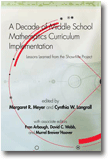
A Decade of Middle School Mathematics Curriculum Implementation
Lessons Learned from the Show-Me Project
Edited by:
Margaret R. Meyer, University of Wisconsin–Madison
Cynthia W. Langrall, Illinois State University
A volume in the series: Research in Mathematics Education. Editor(s): Denisse R Thompson, University of South Florida. Mary Ann Huntley, Cornell University. Christine Suurtamm, University of Ottawa.
Published 2008
Associate Editors Fran Arbaugh, University of Missouri–Columbia, David C. Webb, University of Colorado at Boulder and Murrel Brewer Hoover, WVSTEM Center @ Marshall University
The purpose of this book is to document the work of the Show-Me Project (1997–2007) and to highlight lessons learned about curriculum implementation. Although the Show-Me Project was charged with promoting the dissemination and implementation of four distinct comprehensive curriculum programs (Connected Mathematics, Mathematics in Context, MathScape, and MathThematics), most of the lessons learned from this work are not curriculum specific. Rather, they cut across the four programs and share commonalities with standards-based curriculum reform at any level. We believe that documenting these lessons learned will be one of the legacies of the Show-Me Project.
We anticipate that the comprehensive nature of this work will attract readers from multiple audiences that include state and district mathematics supervisors, middle grades mathematics teachers and administrators involved in curriculum reform, as well as mathematics teacher educators. Those about to embark on the review of curriculum materials will appreciate reading about the processes employed by other districts. Readers with interests in a particular curriculum program will be able to trace the curriculum-specific chapters to gain insights into how the design of the curricula relate to professional development, adoption and implementation issues, and teachers’ personal experience using the curriculum materials. Individuals who provide professional development at the middle grades level will find chapters that they can use for both general and focused discussions. Teachers at all stages of implementation will recognize their own experiences in reading and reflecting on the stories of teacher change. Mathematics educators will find ideas on how these curricula can be used in the preparation of preservice middle grades teachers.
CONTENTS
Preface. PART I: SETTING THE STAGE. The Road to Reform, Robert Reys. The Genesis of the NSF Curriculum Implementation Centers, John S. (Spud) Bradley. The Show-Me Project: A Decade of Support for Standards-Based Curriculum Implementation, Barbara Reys. PART II: ADOPTION CASE STUDIES AND IMPLEMENTATION STORIES. Teacher Investment in Curriculum Adoption: The Role of Piloting Materials, Cary Tuckey. Consensus Building: A Key Component of Curriculum Adoption, Cheryl Rectanus. The Critical Work of a Review Committee in Curriculum Adoption, Leslie E. J. Nielsen. Informing a State Adoption Process Through Curriculum Implementation, Murrel Brewer Hoover. Curriculum Implementation Through Teacher Collaboration, Chip Sharp. Curriculum Implementation: Teachers on a Journey, Carol Den Otter. The Role of Teacher Leaders in Curriculum Implementation, Emily R. Fagan and Rhonda K. Weinstein. Supporting Curriculum Implementation Through Its Ups and Downs, Linda A. Tetley. When Things Go Wrong in Curriculum Implementation, Jane O. Swafford and Cynthia W. Langrall. Issues of Implementation: Making Mathematics Accessible to All Learners, Jennifer M. Bay-Williams and Rebecca McGraw. PART III: PROFESSIONAL DEVELOPMENT AND TEACHER EDUCATION. An Overview of Professional Development, Elizabeth Phillips, Glenda Lappan, Yvonne Grant, and Fran Arbaugh. Key Features of Connected Mathematics for Professional Development, Elizabeth Phillips and Glenda Lappan. Key Features of Mathematics in Context for Professional Development, David C. Webb. Key Features of MathScape for Professional Development, Fred Gross and Emily R. Fagan. Key Features of Middle Grades Maththematics for Professional Development, Rick Billstein and Jim Williamson. Teachers' Needs at Different Phases of Curriculum Implementation, Fran Arbaugh. Professional Development for Administrators: What They Need to Know to Support Curriculum Adoption and Implementation, Margaret R. Meyer and Fran Arbaugh. A Story of Teacher Growth: Increasing Expectations, Jane Peterson Porath. A Story of Teacher Growth: Teacher as Learner, Barbara Diliegghio. A Story of Teacher Growth: Making a Difference, Kelly Watts. A Story of Teacher Growth: From Telling to Facilitating, Fabienne Anderson. Research Mathematician and Mathematics Educator: A Foot in Both Worlds, Ira J. Papick. Using NSF-Funded Mathematics Curricula to Enhance Teacher Preparation, Jeffrey Frykholm. NSF-funded Mathematics Curricula in the Field: A Preservice Teacher's Opportunity to See Theory in Practice, Ann Bledsoe. PART IV: WHAT HAVE WE LEARNED AND WHERE DO WE GO FROM HERE? Lessons Learned from the Show-Me Project, Barbara Reys. Looking into the Future: Curriculum Challenges for the Next Ten Years, Margaret R. Meyer and Cynthia W. Langrall. References.
REVIEWS
"Any school district that is considering an adoption of a new mathematics program will find this book to be a valuable resource. Middle schools districts who have already adopted one of these standard-based mathematics curricula will find a great deal of useful information to help them with professional development. Any mathematics educator, teacher, supervisor or administrator will find this book extremely informative about lessons learned about curriculum implementation over the last ten years and will be motivated to think about the future of standards-based curriculum reform." Dr. Carol A. Rodano Rowan University in Education Review
-
Paperback978-1-60752-012-2
Web price: $45.04 (Reg. 52.99)
-
Hardcover978-1-60752-013-9
Web price: $80.74 (Reg. 94.99)
- eBook9781607528104

- MAT030000 - MATHEMATICS: Study & Teaching
- EDU029010 - EDUCATION: TEACHING METHODS & MATERIALS: Mathematics
- EDU037000 - EDUCATION: Research
-
 Approaches to Studying the Enacted Mathematics Curriculum
Approaches to Studying the Enacted Mathematics Curriculum
-
 Digital Curricula in School Mathematics
Digital Curricula in School Mathematics
-
 International Perspectives on Mathematics Curriculum
International Perspectives on Mathematics Curriculum
-
 International Perspectives on Mathematics Teacher Education
International Perspectives on Mathematics Teacher Education
-
 Language and Mathematics Education
Multiple Perspectives and Directions for Research
Language and Mathematics Education
Multiple Perspectives and Directions for Research
-
 Researching Pedagogy and Practice with Canadian Mathematics Teachers
Researching Pedagogy and Practice with Canadian Mathematics Teachers
-
 Variability is the Rule
A Companion Analysis of K-8 State Mathematics Standards
Variability is the Rule
A Companion Analysis of K-8 State Mathematics Standards

